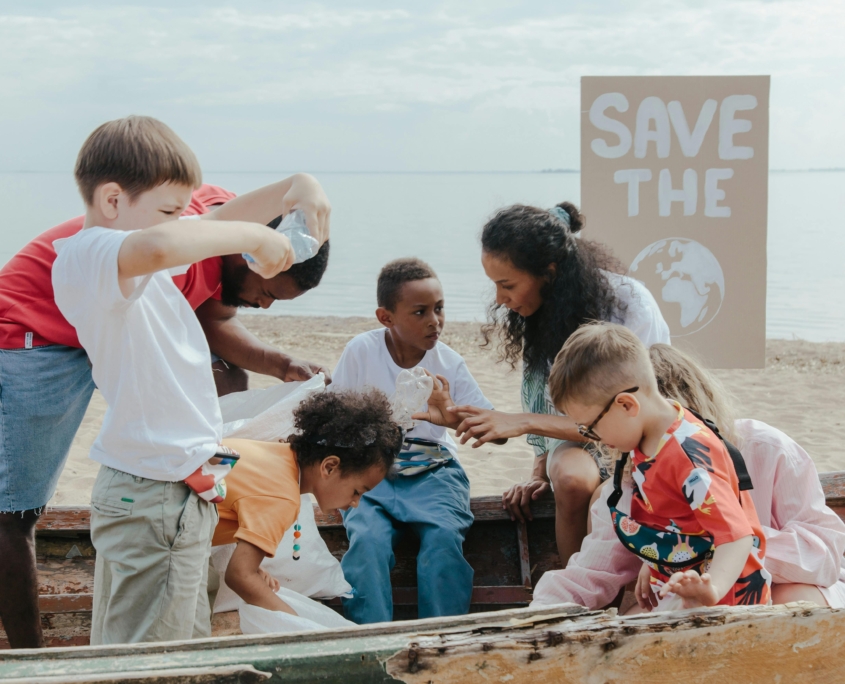Eco-Friendly Search Engines Fight Poverty and Pollution
 The internet has revolutionized communication and access to information, but its environmental impact is often overlooked. According to the International Energy Agency, global data centers consumed around 200 terawatt-hours of electricity in 2022—equivalent to the energy use of some mid-sized countries. Search engines contribute to this consumption, with each Google search generating an estimated 0.2 to 7 grams of CO₂, depending on the device used. This environmental strain disproportionately affects low-income communities, where pollution, waste and water scarcity worsen poverty. To address these challenges, eco-friendly search engines like Ecosia, Ekoru and GiveWater have emerged, transforming everyday internet use into a force for environmental restoration and community support.
The internet has revolutionized communication and access to information, but its environmental impact is often overlooked. According to the International Energy Agency, global data centers consumed around 200 terawatt-hours of electricity in 2022—equivalent to the energy use of some mid-sized countries. Search engines contribute to this consumption, with each Google search generating an estimated 0.2 to 7 grams of CO₂, depending on the device used. This environmental strain disproportionately affects low-income communities, where pollution, waste and water scarcity worsen poverty. To address these challenges, eco-friendly search engines like Ecosia, Ekoru and GiveWater have emerged, transforming everyday internet use into a force for environmental restoration and community support.
Ecosia
Ecosia, an eco-friendly search engine with the same functionality as Google, offers users a greener alternative. Its tagline, “familiar search, greener impact,” reflects the company’s commitment to sustainability. Ecosia has planted more than 225 million trees and dedicated approximately €92 million to climate action.
The Ecosia team channels 100% of its profits into climate initiatives, with a significant portion supporting its global tree-planting program. Working with local organizations in more than 35 countries, Ecosia’s efforts yield widespread benefits. In Brazil, reforestation protects endangered species, while in Senegal, it restores land fertility.
In Senegal, Ecosia collaborates with Trees for the Future to establish forest gardens, where trees and shrubs grow alongside fruits and vegetables. These gardens improve soil water retention, increase crop diversity and create new income opportunities for small farmers. As a result, farmers can cultivate produce previously unsuited to dry soil while expanding their agricultural capacity. This initiative generates sustainable income for low-income rural communities. Since 2018, Ecosia has planted more than 17 million trees and restored 5,909 hectares of land across Senegal.
Ekoru
Ekoru operates as an eco-friendly search engine that generates revenue through clicks. Unlike traditional platforms, each click on a sponsored link supports ocean restoration efforts. Founders Ati Bakush and Alison Lee allocate 60% of Ekoru’s profits to initiatives like Big Blue Ocean Cleanup and Operation Posidonia. These organizations possess the labor and resources needed to advance Ekoru’s mission of restoring ocean health.
Ekoru’s impact extends across its partnerships, facilitating beach cleanups and microplastic research. Plastic waste and nonrecyclable materials pose significant threats to low-income countries, where limited infrastructure prevents proper disposal. When plastic washes ashore, it disrupts local ecosystems and undermines fishing enterprises.
Recognizing the potential for change, Ekoru aims to counteract ocean pollution and broader environmental harm. The platform operates on hydroelectric power, while its data centers rely on convection cooling instead of traditional air conditioning. This approach ensures that every Ekoru search promotes sustainability from the outset.
Give Water
GiveWater offers a search engine alternative designed to improve global health by expanding access to clean water. The platform tackles the impact of drought and environmental challenges that limit water availability. Safe, clean water not only provides hydration but also supports sanitation and hygiene. According to GiveWater, 844 million people lack access to clean water, exposing communities to illness and even death. In many remote villages, families must travel long distances to fetch water, wasting time and facing health risks that deepen poverty in low-income areas.
GiveWater channels a portion of its profits from sponsored clicks to partners like Water.org and Living Water International. Water.org bridges the financial gap for impoverished families lacking access to safe drinking water. Living Water International installs water systems tailored to community needs, guided by regional experts who understand local cultures and landscapes.
Janaki, a South Asian resident, highlighted the impact of these ongoing efforts, explaining how a nearby water source has transformed her community’s outlook. The convenience allows more time for school and work, eliminating the need for long journeys to secure basic needs. This increased access to water fosters educational and professional advancement, reducing poverty in vulnerable communities.
Small Changes Make a Big Difference
By choosing eco-friendly search engines, internet users could transform routine web browsing into meaningful action. These platforms fund tree planting, ocean cleanup and clean water initiatives, tackling both environmental degradation and poverty. As digital consumption continues to rise, such innovations reveal that small changes in technology use can potentially drive sustainable development and improve lives worldwide.
– Sarah Lang
Sarah is based in Pittsburgh, PA, USA and focuses on Technology and Politics for The Borgen Project.
Photo: Pexels
